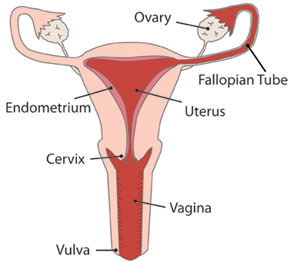Blocked or damaged fallopian tubes
If the fallopian tubes are completely blocked then it is impossible for the egg to reach the womb after it has been released, and it is impossible for sperm to reach the egg and fertilise it to begin a potential pregnancy.
If the fallopian tubes are open but damaged it is more difficult for the egg to travel through the tubes to the womb. A fertilised egg may even become lodged and implant itself in the tube causing an ectopic pregnancy.
If only one tube is open the chances of pregnancy are reduced because the ovaries tend to release eggs on alternating months. An egg will, therefore, only have a chance of fertilisation every two months.
Causes
- Infection
This is a very common cause. The most common infection to cause blockage is a bacteria known as Chlamydia which is a sexually transmitted disease. All patients are screened for this as part of routine testing when they first begin treatment and investigations. - Adhesions and scarring from previous abdominal surgery
This is a common side effect of abdominal surgery. Adhesions are growths of tissue which stick to and can obstruct and distort organs. - Inflammation from an episode of appendicitis
- Severe Endometriosis
- Large fibroids in the uterus
- Sterilisation
Treatment options
The above may be best treated by In-Vitro Fertilisation (IVF) or surgery. Surgery may be open (traditional) or laparoscopic (keyhole). The success of treatment for blocked fallopian tubes depends on the cause and the location of the blockage as well the exact extent of scarring to the tube.
Detailed information is available about both treatments on the surgery page and IVF page.
